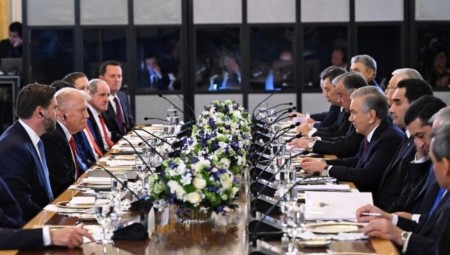Against the backdrop of uncertain trade relations between the United States and China, senior government officials from across Asia and the Pacific gathered in Bangkok this week to re-iterate their commitment to strengthening regional trade and investment.
Convened by the United Nations Economic and Social Commission for Asia and the Pacific (ESCAP) from 11 to 15 March, the Asia-Pacific Trade and Investment Week is a regional platform to discuss issues of importance to trade and investment for ember States.
A key event of the five-day meeting is the Sixth Session of the Committee on Trade and Investment, which provides guidance to ESCAP on its work on bolstering trade and investment cooperation. Delegates engaged in thematic deliberations, including discussions on the implications of rising protectionism for the region, the benefits of trade digitalization, navigating non-tariff measures for sustainable development, and the pivotal role of science, technology and innovation policies.
Opening the Committee, ESCAP Executive Secretary Armida Alisjahbana said, “ESCAP analysis shows that regional integration can be a powerful stabilizing force, and could offset economic losses caused by international trade tensions.”
Addressing participants, Director-General of the Trade Policy and Strategy Office at the Ministry of Commerce, Thailand Ms. Pimchanok Vonkorpon highlighted that, “ESCAP can be a bridge among countries with different backgrounds, needs and experience on trade and investment development that is changing rapidly.” She added that ESCAP can play a crucial role in forging cooperation and collaboration in the future.
A record number of 30 member States also attended the intergovernmental steering group on cross-border paperless trade facilitation, which made progress on shaping regional and national action plans to accelerate trade digitalization in Asia and the Pacific. The preliminary results for the region of the UN Global Survey on Digital and Sustainable Trade Facilitation were reviewed and blockchain and other frontier technologies explored to reduce the use of paper documents in trade transactions and boost regional integration.
Among the highlights of Trade and Investment Week was the ‘soft’ launch of ESCAP’s Trade Intelligence and Negotiation Advisor (TINA), an automated online platform that is designed to assist, particularly developing and least developed countries, with often complex trade negotiations. The platform, accessible on http://tina.negotiatetrade.
Another highlight was the launch of the Women Micro, Small and Medium-sized Enterprises (MSME) Fintech Innovation Fund. The Fund will support the expansion of innovative digital and fintech solutions for women-led MSMEs. Implemented as part of a five-year, Canada-funded ESCAP project which aims to support the growth of women entrepreneurs in Asia and the Pacific, the fund is hosted by the United Nations Capital Development Fund’s (UNCDF) Fund Facility investment mechanism, and also has financial support from the Netherlands Development Finance Cooperation (FMO).
“The Women MSME Fintech Innovation Fund contributes to SDG5 by providing support for greater financial inclusion for women including their access to capital, markets and business development services. The Fund is aligned with Canada’s feminist development policy and Canada is pleased to support the Fund’s work to support innovation to allow women to grow their businesses, improve their lives, and contribute to their families and communities,” said H.E. Ms. Donica Pottie, Ambassador of Canada to Thailand.
Rajeev Kumar Gupta, UNCDF SHIFT Programme Manager noted, “We will be working to co-fund creative solutions that truly address the specific barriers women MSMEs face. With innovative digital and fintech solutions changing the landscape of how MSMEs operate, we look forward to working with the next generation of innovations to impact women MSMEs in the Asia-Pacific region.”














